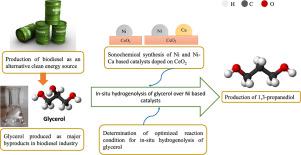Molecular Catalysis ( IF 3.9 ) Pub Date : 2021-09-10 , DOI: 10.1016/j.mcat.2021.111860 Ain Syuhada 1 , Mariam Ameen 1, 2 , Mohammad Tazli Azizan 3, 4 , Aqsha Aqsha 5 , Mohd Hizami Mohd Yusoff 1, 2 , Anita Ramli 2, 6 , Mohamad Sahban Alnarabiji 1 , Farooq Sher 7

|
1,3-Propanediol (1,3-PDO) is a commercially valuable chemical for the production of polytrimethylene terephthalate polymers and polyurethane. In this study, the production of 1,3-PDO was investigated via aqueous phase reforming (APR) and selective hydrogenolysis of glycerol over Ni-Ca/CeO2 catalysts synthesized by sonochemical (Us) and wet impregnation (WI) methods. The experiments were performed in a batch reactor at 20 bar, 230 ℃, and 450 rpm for 1 h. The synthesized catalysts were characterized using XRD, TEM, FESEM, BET, H2-TPR, XPS, CO-chemisorption, and NH3-TPD to better understand the physio-chemical and surface characteristics. The results revealed that sonochemical catalysts showed a larger surface area, smaller crystallite size, low reduction temperature and more homogenous particle distribution than wet impregnation catalysts. For both preparation methods, monometallic Ni/CeO2 catalysts showed the highest activity, whereas Ca modification of Ni/CeO2 catalysts significantly decreased the activity of the catalysts. The highest yield and selectivity of 1,3-PDO were 19.54% and 52.73%, respectively, using Ni/CeO2_Us catalyst. The best catalyst was further utilized for parameters optimization study to observe the effect of varying glycerol concentration (10 to 25 vol.%), temperature (210 to 250 ℃) and pressure (10 to 30 bar) on the yield and selectivity of 1,3-PDO and glycerol conversion. The results demonstrated that the highest yield (19.54%) and selectivity (52.73%) of 1,3-PDO were obtained over 10 vol.%, 230 ℃ and 20 bar with glycerol conversion of 54.26%. This present study provides a promising and economical process of converting glycerol to 1,3-PDO, which has wide applications in the industry.
中文翻译:

在声化学合成的镍基纳米催化剂上使用通过甘油水相重整产生的氢气原位氢解甘油
1,3-丙二醇 (1,3-PDO) 是一种具有商业价值的化学品,用于生产聚对苯二甲酸丙二醇酯聚合物和聚氨酯。在这项研究中,通过水相重整 (APR) 和甘油在通过声化学 (Us) 和湿浸渍 (WI) 方法合成的Ni-Ca/CeO 2催化剂上的选择性氢解来研究 1,3-PDO 的生产。实验在间歇式反应器中在 20 bar、230 ℃和 450 rpm 下进行 1 h。合成的催化剂使用 XRD、TEM、FESEM、BET、H 2 -TPR、XPS、CO 化学吸附和 NH 3 进行表征-TPD 以更好地了解物理化学和表面特性。结果表明,与湿浸渍催化剂相比,声化学催化剂具有更大的表面积、更小的晶粒尺寸、更低的还原温度和更均匀的颗粒分布。对于两种制备方法,单金属Ni/CeO 2催化剂表现出最高的活性,而Ni/CeO 2催化剂的Ca 改性显着降低了催化剂的活性。1,3-PDO 的最高产率和选择性分别为 19.54% 和 52.73%,使用 Ni/CeO 2_我们的催化剂。进一步利用最佳催化剂进行参数优化研究,观察不同甘油浓度(10~25vol.%)、温度(210~250℃)和压力(10~30bar)对1的产率和选择性的影响, 3-PDO 和甘油转化。结果表明,1,3-PDO 在 10 vol.%、230 ℃和 20 bar 条件下的产率(19.54%)和选择性(52.73%)最高,甘油转化率为 54.26%。本研究提供了一种将甘油转化为 1,3-PDO 的有前景且经济的方法,该方法在工业中具有广泛的应用。











































 京公网安备 11010802027423号
京公网安备 11010802027423号